
Dairy herd at Hameau Farm, a Dairy Grazing Apprenticeship host farm. Credit: Emily Decker
Founded by dairy farmers in Wisconsin, Dairy Grazing Apprenticeship was the first nationally registered farming apprenticeship in the country and is now operating in several states. Pasa administers the program in Pennsylvania and surrounding areas.
The two-year program pairs beginning farmers with established farmers, who serve as both employer and mentor, to provide a guided pathway toward managing or starting a dairy grazing farm. Using a model of education that has prepared skilled workers in the trades for generations, the apprenticeship combines paid, on-the-job training with related technical coursework in business management, herd health, dairy nutrition, soil, and more.
Dairy is the largest agricultural industry in Pennsylvania, and grass-based dairy products are in-demand—Dairy Grazing Apprenticeship is training the next generation of dairy farmers, from pasture to cheese cave, how to compete in an often challenging market.
“Dairy is the largest agricultural industry in Pennsylvania, and grass-based dairy products are in-demand—Dairy Grazing Apprenticeship is training the next generation of dairy farmers, from pasture to cheese cave, how to compete in an often challenging market.”
In March of 2019, the Pennsylvania Department of Labor and Industry also approved Diversified Vegetable Apprenticeship, a program for vegetable farmers developed by Pasa in collaboration with 19 farms in the state. It was the first state-registered apprenticeship for diversified vegetable farmers in the nation. Dairy Grazing Apprenticeship and Diversified Vegetable Apprenticeship are currently the only state-registered apprenticeships specifically catered to farmers in the Commonwealth.
Unlike many informal apprenticeships, which often charge tuition or do not compensate apprentices for their work, state- or federally registered programs require host farms to pay apprentices an hourly wage. Some farms offer additional in-kind compensation, such as housing or other professional development opportunities, or schedule wage increases as apprentices develop their skills.
By ensuring apprentices are compensated for their labor, registered apprenticeships acknowledge the value of an apprentice’s contributions to a farm business and make farming training more widely accessible. They also serve to support the labor needs of established businesses.
“By ensuring apprentices are compensated for their labor, registered apprenticeships acknowledge the value of an apprentice’s contributions to a farm business. It also ensures that farming training is more widely accessible accessible. They also serve to support the labor needs of established businesses.”
During a time when 75 percent of beginning and aspiring farmers under the age of 40 in the U.S. did not grow up on a farm, farmer training programs are becoming increasingly vital. Without the traditional transfer of knowledge between parents and children, aspiring farmers need hands-on opportunities to learn the intricacies of stewarding land, tending crops and running a financially viable business. And as more farmers approach retirement—the average age of a farmer in Pennsylvania is nearly 57—the country faces a critical labor shortage, threatening the stability of the food supply.
Farming is highly skilled work, requiring knowledge of everything from botany and ecology to marketing and business. Registered apprenticeships provide the rigorous training beginning farmers need to succeed. Plus, they have the potential to achieve a level of scale few other training programs can match.
Interested in becoming an apprentice or hosting one? Learn more.